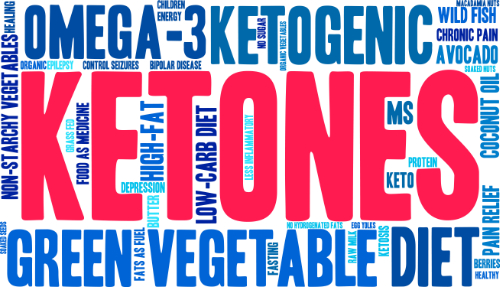There has been a lot of talk about a ketogenic diet, also known as a low carb diet. While science has proven again and again the numerous health benefits, there are still those that seek to disclaim it. This guide will explain the ketogenic diet, ketones, and the many health benefits that this way of eating provides.
What are Exogenous Ketones?
 In order to understand exogenous ketones, it is important to first know what ketones are. Simply put, ketones are carbon based, organic compounds that are produced in the liver. They are used by the mitochondria within the body to generate energy and can replace glucose as s fuel source, putting the body in a state of ketosis.
In order to understand exogenous ketones, it is important to first know what ketones are. Simply put, ketones are carbon based, organic compounds that are produced in the liver. They are used by the mitochondria within the body to generate energy and can replace glucose as s fuel source, putting the body in a state of ketosis.
Exogenous ketones are ketones that are taken into the body as nutritional supplements. Endogenous ketones are produced in the body, specifically, the liver. Exogenous ketones are not produced in the body, rather are introduced into the body through supplements.
What is a Ketogenic Diet?
A ketogenic diet is characterized by three primary markers:
- Low carbohydrate
- Adequate protein
- High fat
It is designed to put the body into a state of ketosis which means that instead of burning carbohydrates for energy, it is forced to burn fat.
When the body consumes foods that are high in carbs, it begins to produce insulin and glucose. Glucose happens to be the path of least resistance when it comes to energy conversion and usage, so the body will opt for that route before any utilizing other energy source.
What are the Benefits of a Ketogenic Diet?
There are several significant health benefits of a ketogenic diet. It was developed to be a way of life (WOL), not just a temporary diet and this was primarily due to the health benefits it provides. In fact, ketone diets were created to help allay or improve the symptoms of certain chronic health conditions, including epilepsy. Other benefits of the ketogenic diet include:
- Weight loss
- Lower insulin levels and reduced blood sugar
- Lower triglycerides
- Effectively treats metabolic syndrome
- Forces the body to burn fat
- Increased HDL (“good” cholesterol) levels
- Improve LDL
- Prevention of certain cancers
- Potential to kill certain cancer cells
- Lowered blood pressure
- Improve epilepsy symptoms
- Helps treat Parkinson’s Disease
- Reverse and treat symptoms of Alzheimer’s
The weight loss occurs from a ketogenic diet is largely fat loss – particularly abdominal fat (visceral fat). It is visceral fat that increases the risk of heart disease, type 2 diabetes, and other health conditions.
A ketogenic diet helps to reduce many of the risks of some of the most debilitating and even deadly chronic health conditions that are so prevalent today. Exogenous ketones provide a powerful supplementation to the diet, improving its effectiveness.
A ketogenic diet is not a quick fix or fad diet; it is indeed a way of life. While many people do see very noticeable results quite quickly, the substantial health benefits that it provides make it worthy of a lifelong commitment. By adhering to this low carb lifestyle, you can reverse many health conditions and avoid others. In short, you will enjoy increased energy and better health for years to come.
I hope you found this article helpful and gained some new knowledge from it. Please, leave a comment or feel free to ask questions. Also, Let your Friends and Family know about the article by sharing it on Facebook.
In Health,
Dr Jerrod Dawson
